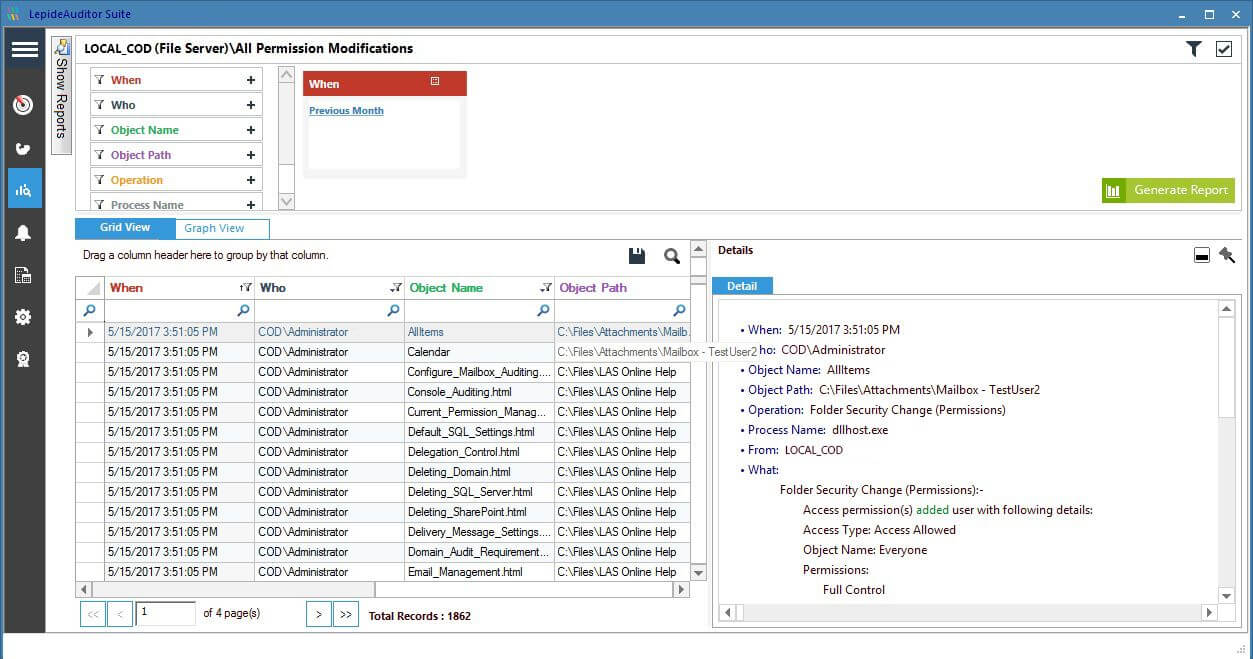
Irrespective of the country, size or sector your organization operates in, it’s more than likely that you’re bound by one or multiple compliance mandates, such as PCI, HIPAA, SOX, FISMA and others. If you handle or process the data of EU citizens, very soon you’re going to be bound by one of the most talked about compliance mandates of recent years; GDPR.
These compliance mandates tend to have one thing in common; stringent reporting requirements to prove efficient and responsible handling of sensitive data. Unfortunately, as many businesses are finding out, the native audit methods for generating such compliance reports fail to provide IT teams and auditors with the level of detail they require and often take an unacceptable amount of time to generate.
Why Current Reporting Methods Fail
Whilst most major compliance regulations only require one audit every year, organizations must ensure they are compliant 24 hours a day, 365 days a year. This requires constant vigilance when it comes to auditing and monitoring data related to compliance mandates. So, what is the current method for a compliance audit and why does it fail?
Usually an external auditor will request a report once per year for each of the compliance mandate that the organization is subject to. In some cases, one report may be able to satisfy numerous compliance requirements. However, actually getting hold of a report that is detailed enough to satisfy an audit can be time consuming and frustrating.
Usually, external auditors not have the permission to generate the audit repot themselves and will have to rely on internal administrators with adequate levels of permission to do this for them. This is, of course, due to the sensitive nature of the data they are dealing with. Internal administrators, however, are not known for the vast amounts of free time they have. They cannot simply drop everything they are doing to manually run multiple reports for an auditor – and so, sometimes, they rush. This can occasionally lead to the report being inadequate or not touching on all the areas that the auditor needs, so it has to be sent back and the process started from scratch.
Another pressing issue is that a one-off report generated specifically for an audit once a year, will not provide an accurate picture of the security processes and controls of the organization. Compliance regulations exist to ensure that organizations are acting responsibly with sensitive data 24/7, 365 days a year. How can a one off compliance report prove that?
All of this is time consuming, frustrating for all parties in involved and, ultimately, unnecessary.
Why Automated Compliance Reports are the Future
Using automation to generate compliance ready reports immediately overcomes some of the most frustrating issues auditors face. Namely, automated compliance reports provide the following benefits:
- They can be generated at regular intervals automatically to prove compliance throughout the year as opposed to at a single point
- Reports always follow the same format which can be pre-determined to suit the compliance auditor’s unique requirements
- Administrators will not have to take time out of their day to manually create reports, as they can be set to generate at regular intervals
- Auditors will have historical compliance reports available to them that enable them to analyze changes over time and prove an organization is compliant all year round
Lepide Data Security Platform – Automated Compliance Reports Made Easy
The aims of every compliance regulation differ, and therefore the specific reports required will also differ. Lepide Data Security Platform contains hundreds of pre-set reports that have been specifically designed to meet individual compliance mandates, including GDPR, PCI, HIPAA, SOX ISO and more. These reports enable auditors to get complete visibility into changes being made across critical systems and to sensitive data through real time auditing, monitoring and alerting.
The pre-defined audit and compliance reports in Lepide Data Security Platform can be scheduled to be delivered to a specified recipient (an auditor, perhaps?) at defined intervals and can also be generated at any point in time in a matter of clicks. They can also be converted into multiple different formats depending on the requirements of the audit. Below is an example of a GDPR specific report relating to personal data processing:

With this report you can prove to auditors that you are monitoring changes in permissions to sensitive files and folders in File Server to ensure personal data is being processes responsibly.



